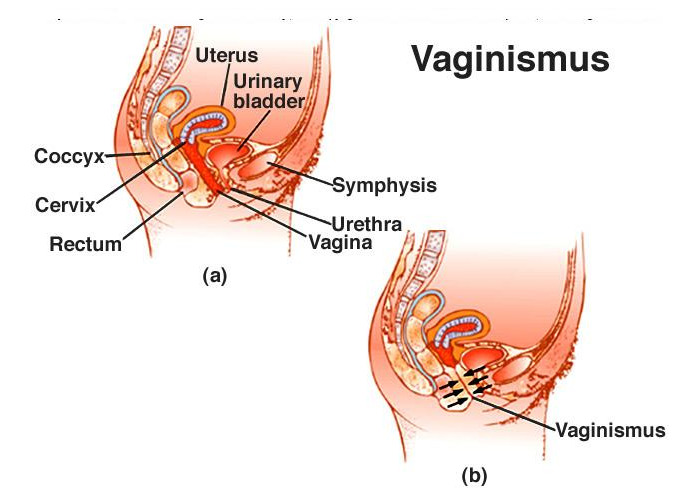Vaginismus
In some women vaginismus prevents all attempts at successful sexual intercourse.
Vaginismus is an involuntary contraction of the muscles surrounding the entrance to the vagina, making penetration painful or impossible. The muscle group involved is called the pubococcygeal muscles (PC). The same ones used for kegel exercises.
Normally, the vaginal sphincter keeps the vagina closed until the need to expand and relax. This relaxation allows for sexual intercourse, medical examination, insertion of tampons and childbirth. Vaginismus occurs when the vagina is unable to relax and permit the penetration of the penis during intercourse however, when vaginismus does occur, the sphincter goes into spasm resulting in the tightening of the vagina.
Vaginismus may even occur anytime in life, even if a woman has a history of enjoyable and painless intercourse.
The severity of vaginismus varies from woman to woman. Some are able to insert a tampon and complete a gynecological exam but are unable to insert a penis. Others are unable to insert anything into their vagina.
Vaginismus is not due to a physical abnormality of the genitals. Some women wonder if their vagina is too small to fit a penis into, or perhaps they have no vaginal opening at all. This is understandable especially when the vaginal muscles are in spasm as they can give the appearance that the opening is nonexistent. These concerns, however, are incorrect as the genital area is completely normal.
In addition to vaginismus, there are a number of other disorders — such as endometriosis, pelvic inflammatory disease, etc. — that can result in painful sexual intercourse or penetration. It’s important that a reliable diagnosis is obtained so that the appropriate treatment can be recommended.
![]()
Nonphysical Causes:
The cause of vaginismus is often a result of an aversive stimulus associated with penetration. Some of the more common aversive stimuli are traumatic sexual assaults, painful intercourse, and traumatic pelvic exam.
Vaginismus may also result from the patient having strong inhibitions about sex stemming from strict religious beliefs or cultural norms.
This disorder does not mean that women suffering from this disorder are frigid. Many are very sexually responsive and may have orgasms through clitoral stimulation. Many women with vaginismus may seek sexual contact and sexual foreplay as long as actual intercourse/vaginal penetration is avoided.
Concepts such as penetration, intercourse and even sex can cause fear or trepidation in the mind of may a young inexperienced woman who may hear stories about painful first intercourse, which then reinforce the fear of penetration. This fear can compound and create a pattern of sexual anxiety, causing the vagina to remain dry and un-relaxed before intercourse.
Treatment:
The treatment of vaginismus is usually a therapy program that includes vaginal dilation exercises using plastic dilators. It’s important that the use of dilators proceeds in a systematic progression under the direction of a sex therapist and should actively involve the woman’s sexual partner. The treatment include gradually more intimate contact eventually culminating in successful and pain free intercourse. Sex education is also very important to counter sexual naivety and dispel any misinformation which has been identified as a factor in 90% of vaginismus cases. This education should include information about sexual anatomy, physiology, the sexual response cycle, and common myths about sex.
Psychotherapy and Counseling:
See a qualified, licensed professional. Anyone can call themselves a sex therapist, so you want to find a qualified, empathetic psychologist or psychiatrist; one you trust. Try to get referred by your own physician or health care provider.
